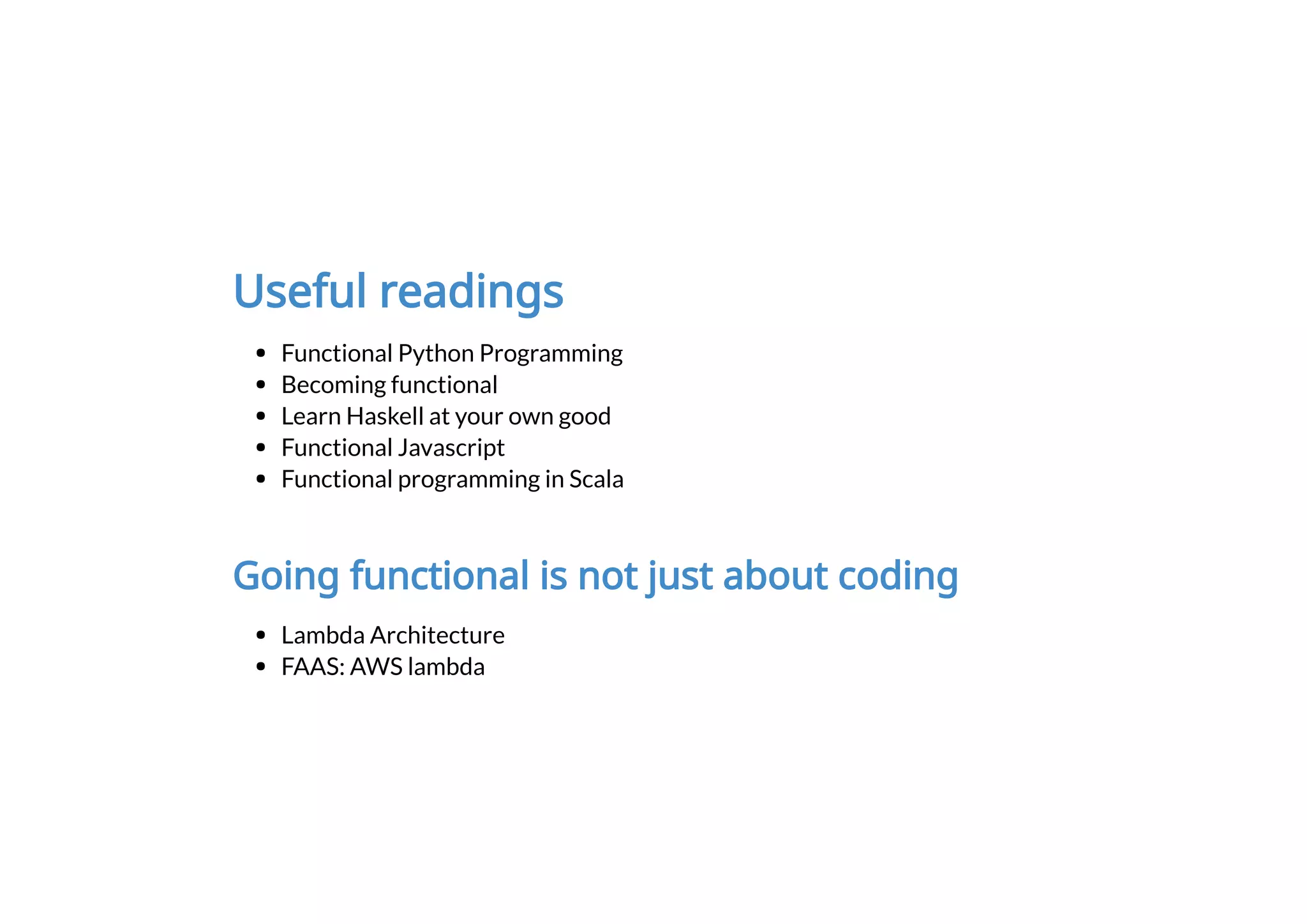The document presents a comprehensive overview of functional programming in Python, highlighting its principles such as immutability, recursion, and higher-order functions. It contrasts functional programming's approach with object-oriented programming (OOP), discussing practical implementation examples and Python features that support functional programming paradigms. Key concepts like function composition, currying, and memoization are explored, alongside design patterns like decorators and monads, offering insights into effective functional programming practices.
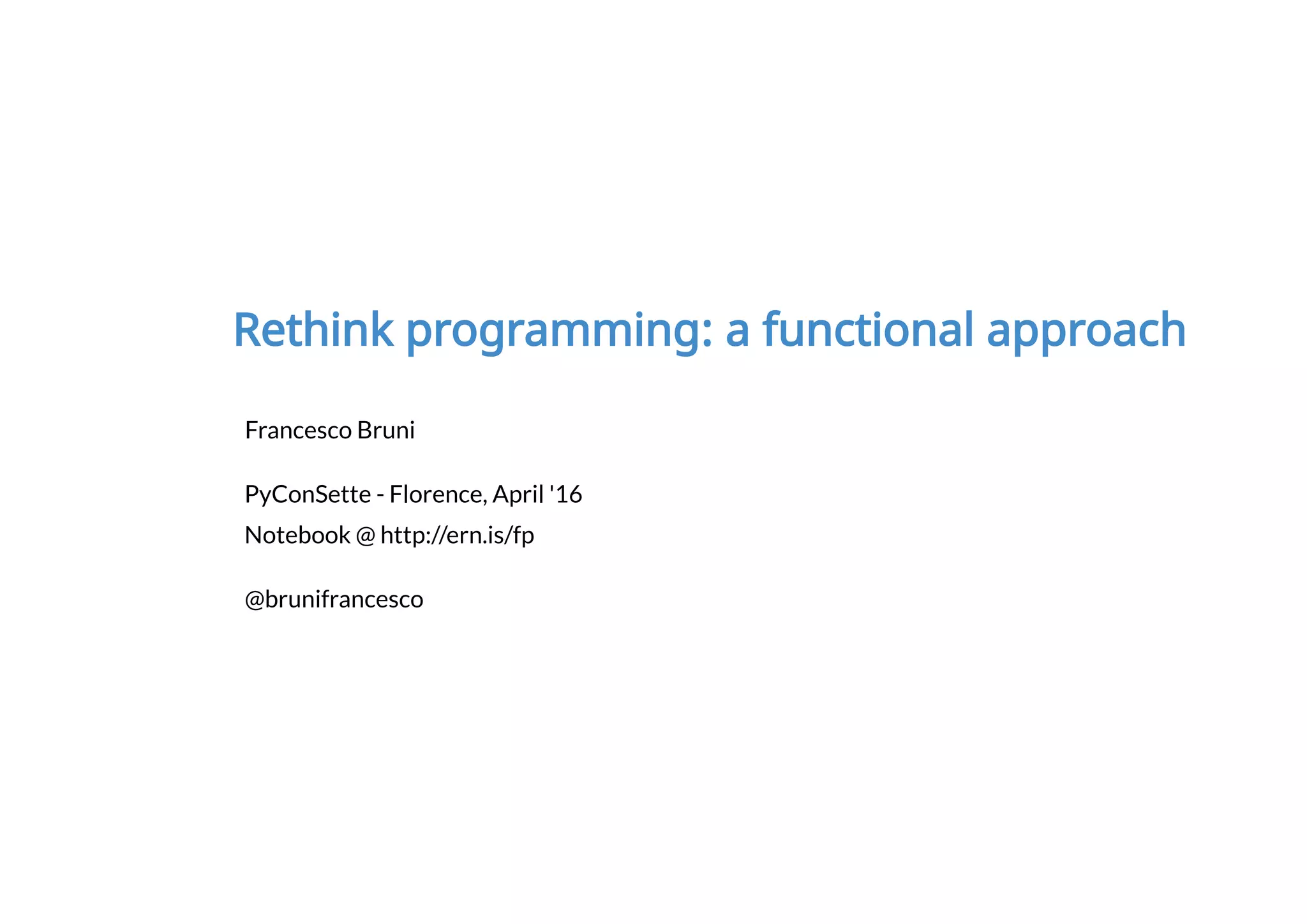

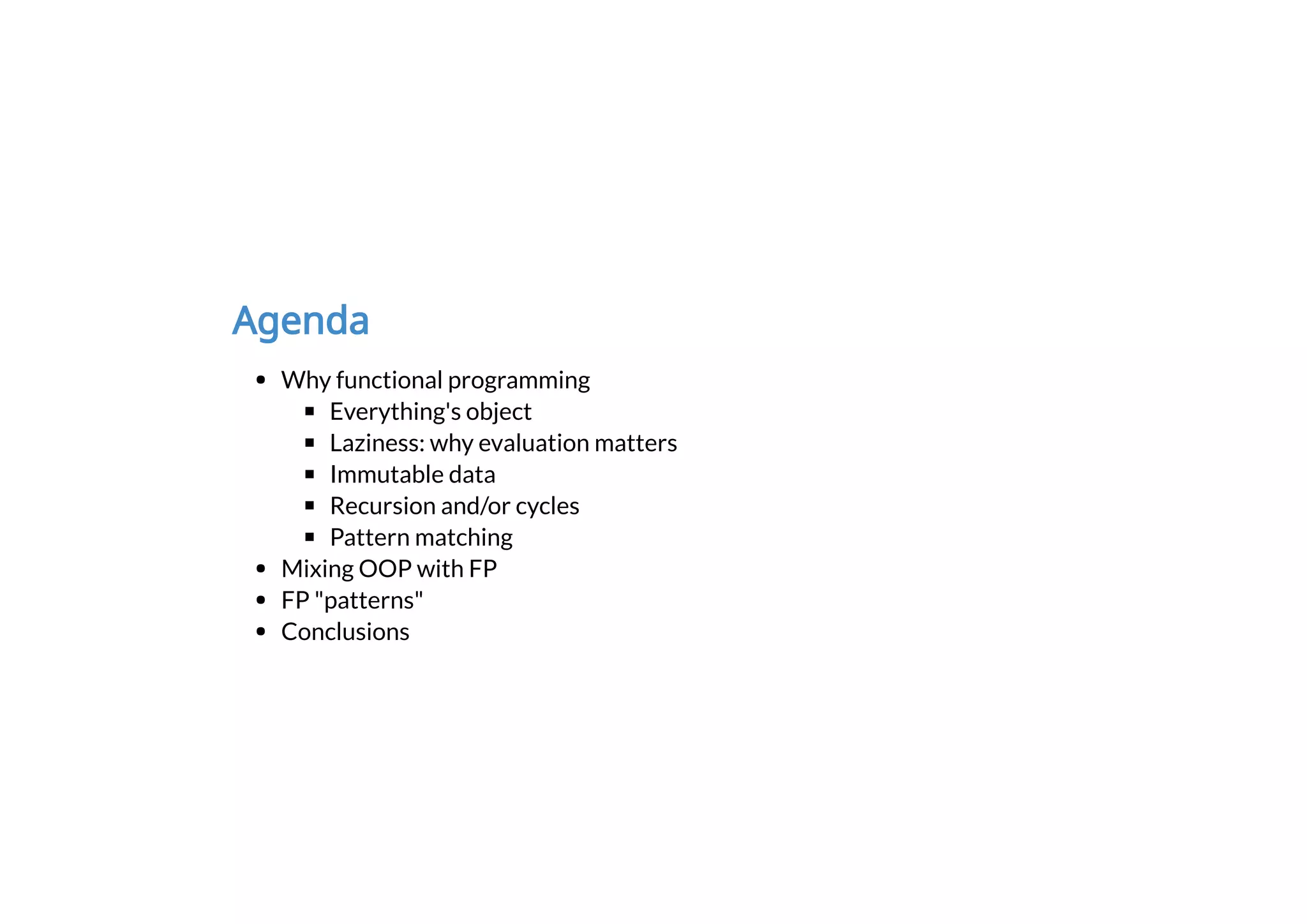

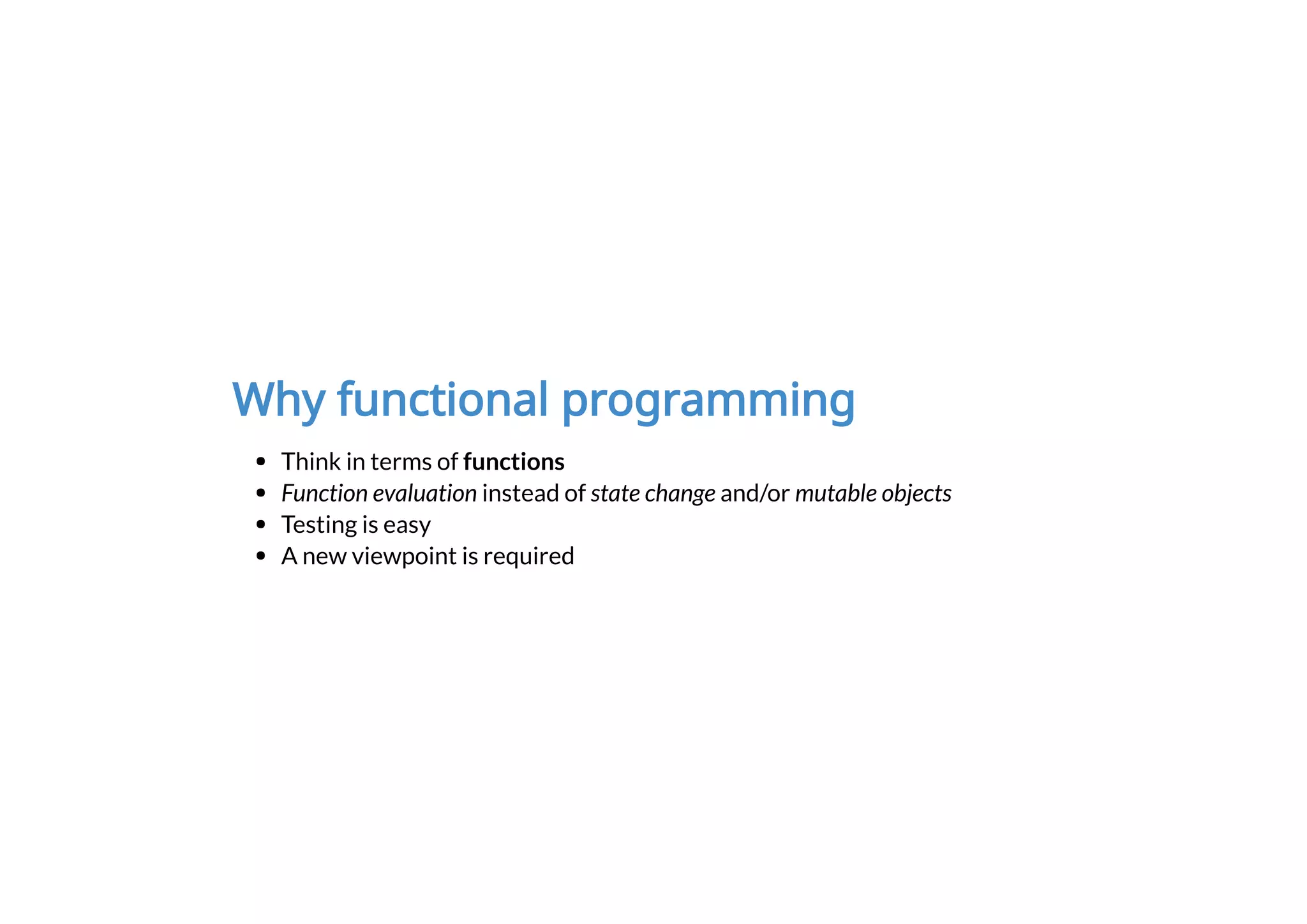
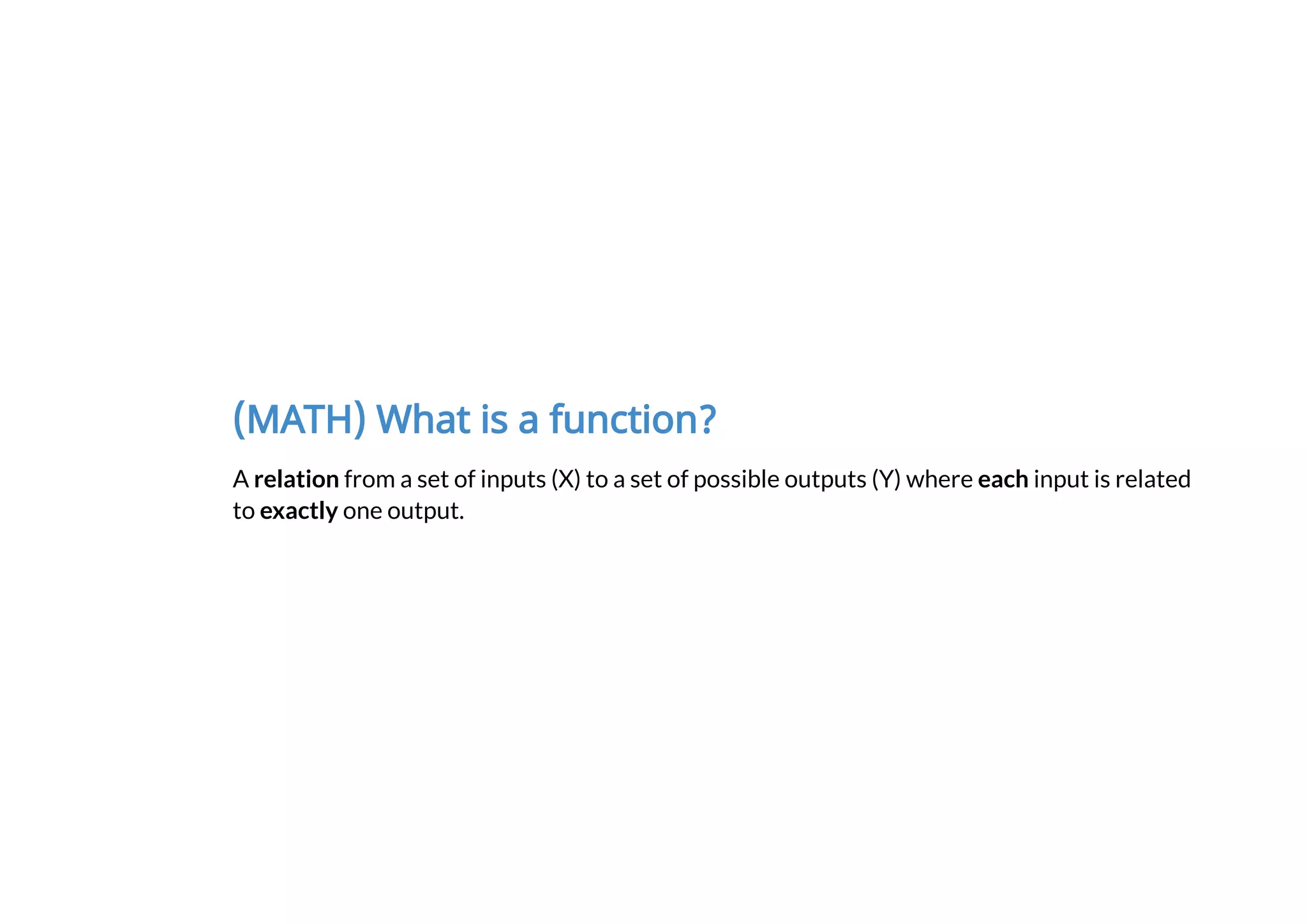
![In [1]: import random
def sum_imperative():
res = 0
for n in [random.random() for _ in range(100)]:
res += n
return res
def sum_functional():
return sum(random.random() for _ in range(100))
print(sum_imperative())
print(sum_functional())
assert True
42.90290739224947
54.64527198535234](https://image.slidesharecdn.com/fp-160417065358/75/Rethink-programming-a-functional-approach-7-2048.jpg)
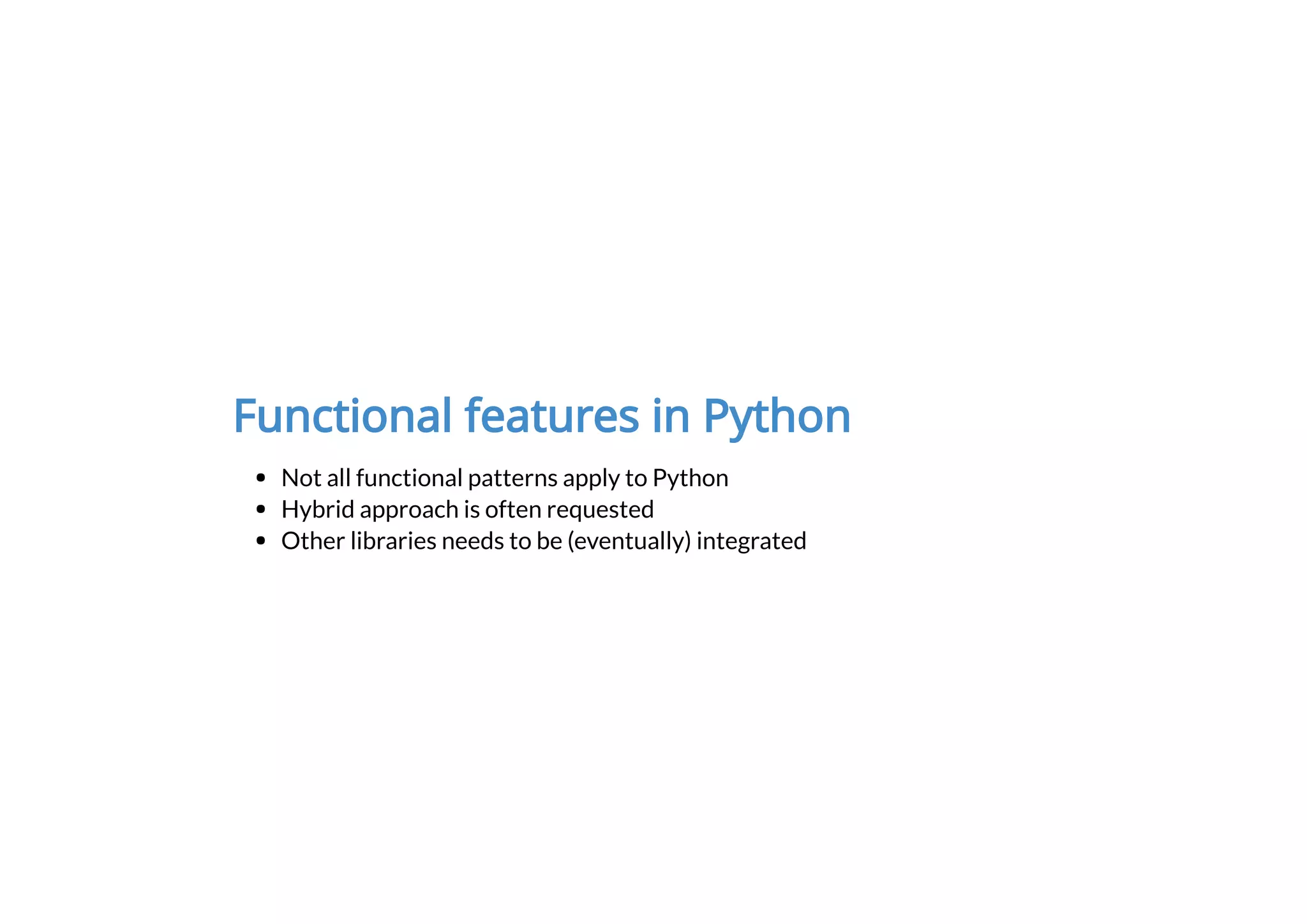
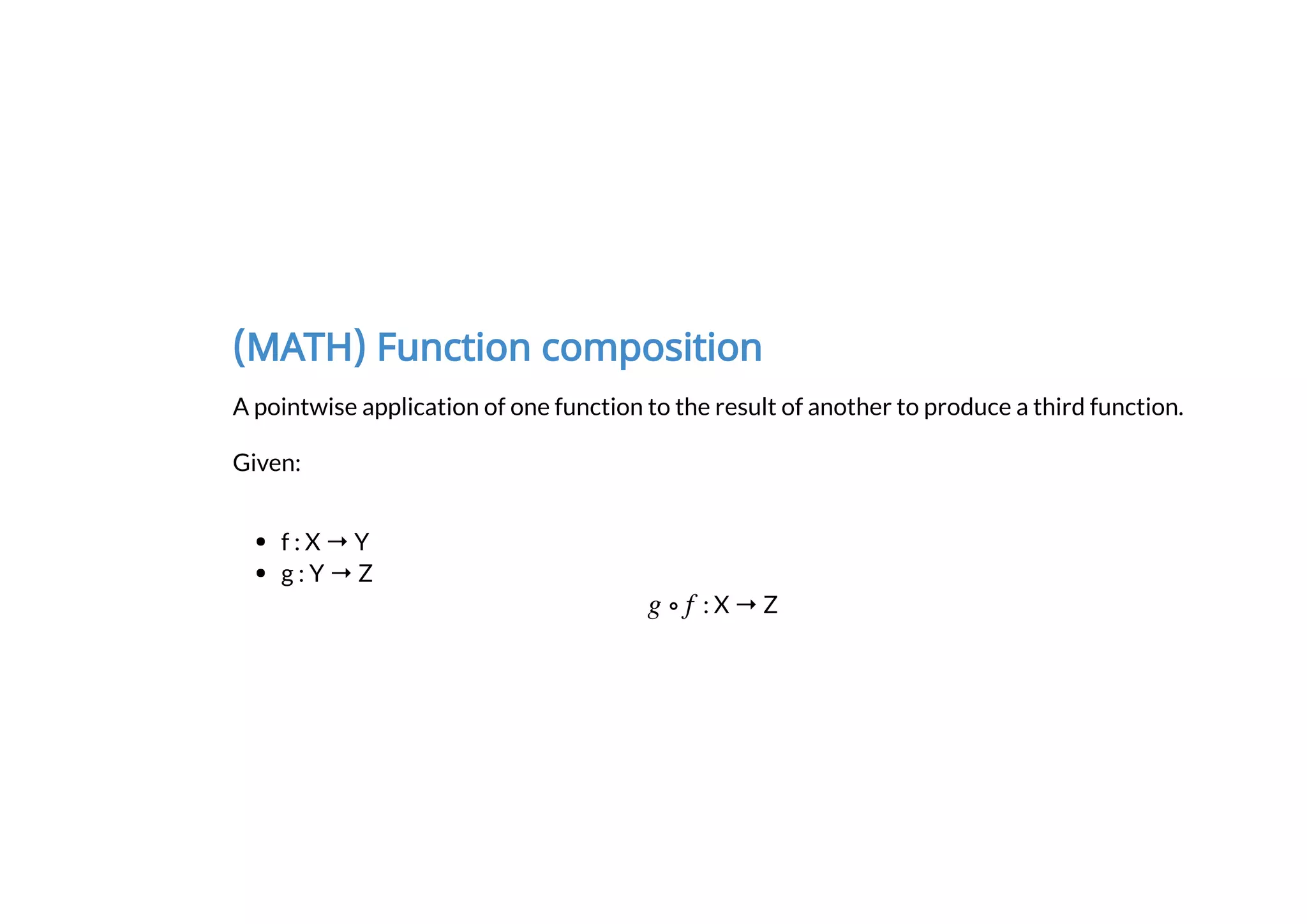

![In [2]: class Fn:
pass
def fn():
"""
Dummy function
"""
return 1+2
print(fn.__doc__.strip())
print(Fn.__name__)
Dummy function
Fn](https://image.slidesharecdn.com/fp-160417065358/75/Rethink-programming-a-functional-approach-11-2048.jpg)
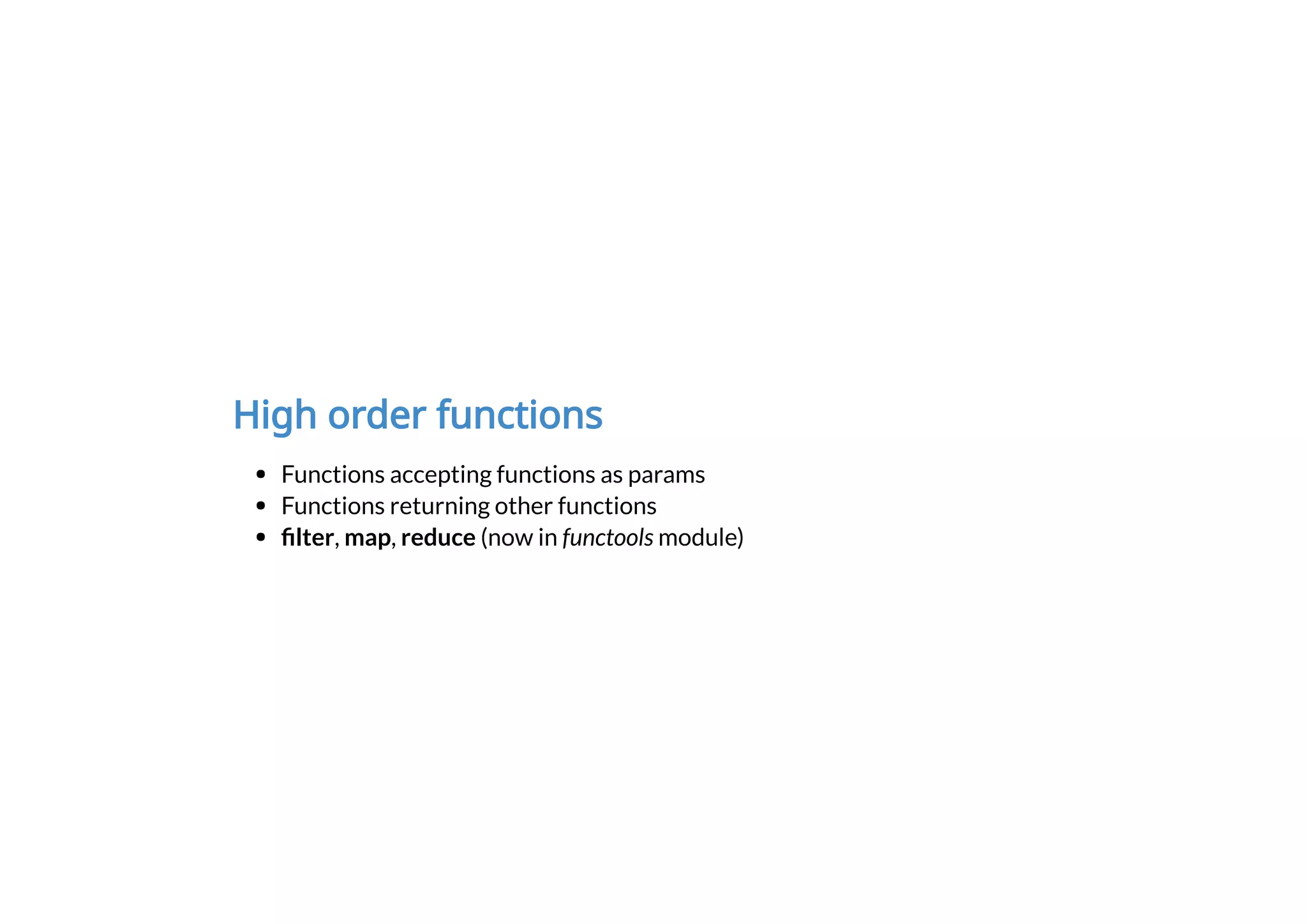
![In [3]: def mapper_func(lst, reduce_func):
"""
Apply a function to each member of <lst>
"""
return map(reduce_func, lst)
def check_if_neg(value):
"""
Check if values is neg
"""
return value > 0
assert list(mapper_func([1,2,3], str)) == ["1", "2", "3"]
assert list(mapper_func(["1","2","3"], int)) == [1, 2, 3]](https://image.slidesharecdn.com/fp-160417065358/75/Rethink-programming-a-functional-approach-13-2048.jpg)
![In [4]: def v3(v):
return v**3
def v2(v):
return v**2
def my_awesome_function(v,h):
return(h(v))
assert my_awesome_function(3,v2) == 9
assert my_awesome_function(3,v3) == 27](https://image.slidesharecdn.com/fp-160417065358/75/Rethink-programming-a-functional-approach-14-2048.jpg)
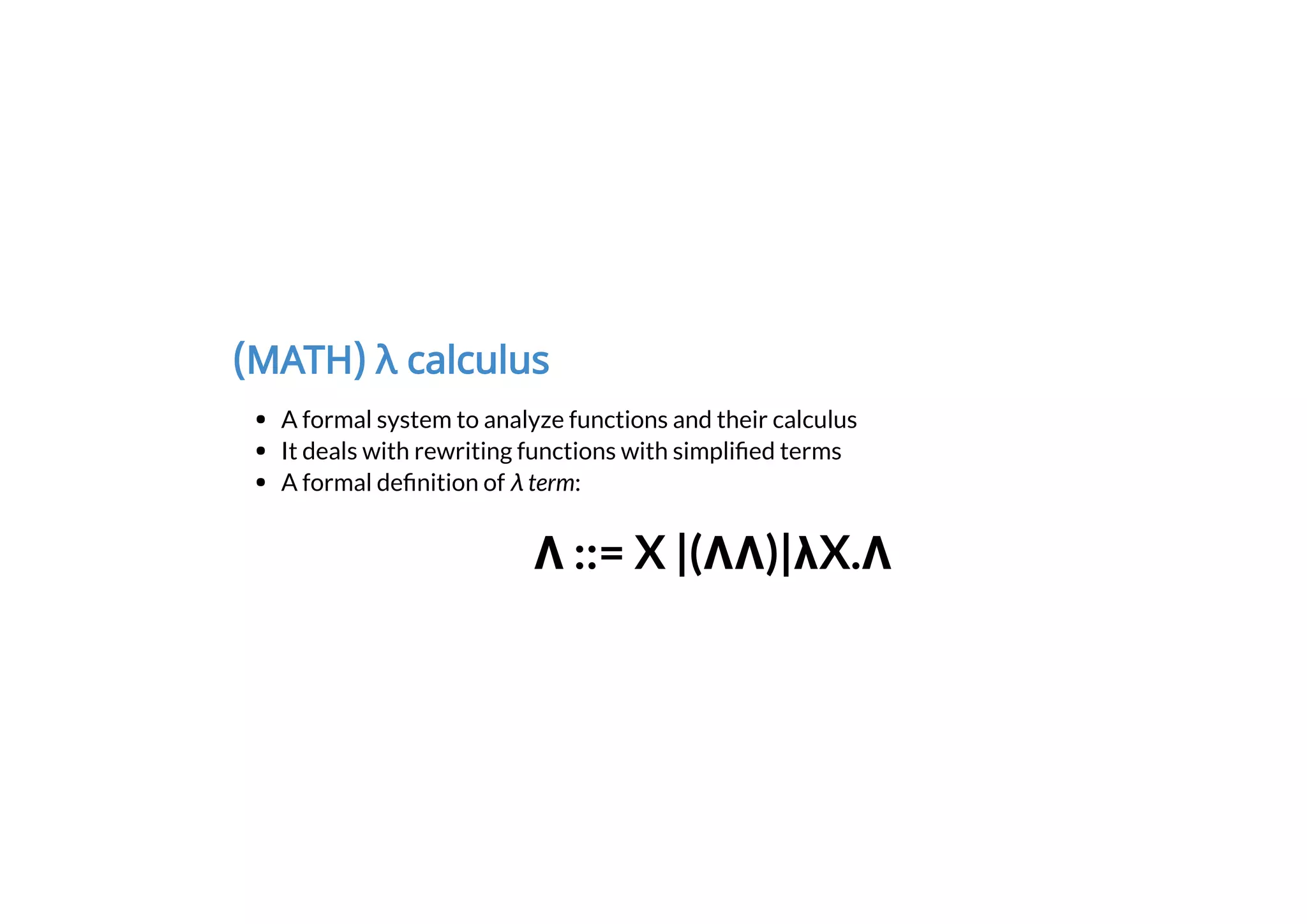
![In [5]: from functools import reduce
def filter_negative_numbers(lst):
"""
Filter negative numbers from <lst>
"""
return filter(check_if_neg, lst)
def reduce_sum(lst):
"""
Reduce list summing up consecutives elements
"""
return reduce(lambda x, y: x+y, lst)
assert list(filter_negative_numbers([-3, 4, 5, -10, 20])) == [4, 5, 20]
assert reduce_sum([-3, 4, 5, -10, 20]) == 16](https://image.slidesharecdn.com/fp-160417065358/75/Rethink-programming-a-functional-approach-16-2048.jpg)

![In [6]: from collections.abc import Callable
from random import random
from statistics import mean
class MapReduceFunction(Callable):
"""
'Chain' two functions to perform map reduce;
the class returns a new callable object
"""
def __init__(self, map_function, reduce_function):
self.map_function = map_function
self.reduce_function = reduce_function
def __call__(self, value):
return map(lambda item: self.reduce_function(item), self.map_function(valu
e))
data = [round(random()*10, 3) for _ in range(0, 23)]
mr = MapReduceFunction(
map_function=lambda item: zip(*[iter(data)] * 7),
reduce_function=lambda item: max(item)
)](https://image.slidesharecdn.com/fp-160417065358/75/Rethink-programming-a-functional-approach-18-2048.jpg)

![In [7]: import random
def filter_out(result=[random.random() for _ in range(0, 5)]):
exclude = map(lambda item: item ** 2, range(30))
result = filter(lambda item: item not in exclude, result)
sorted_result = sorted(result, key=lambda item: str(item)[1])
return map(lambda item: round(item, 2), sorted_result)
filter_out()
Out[7]: <map at 0x108dd5630>](https://image.slidesharecdn.com/fp-160417065358/75/Rethink-programming-a-functional-approach-20-2048.jpg)
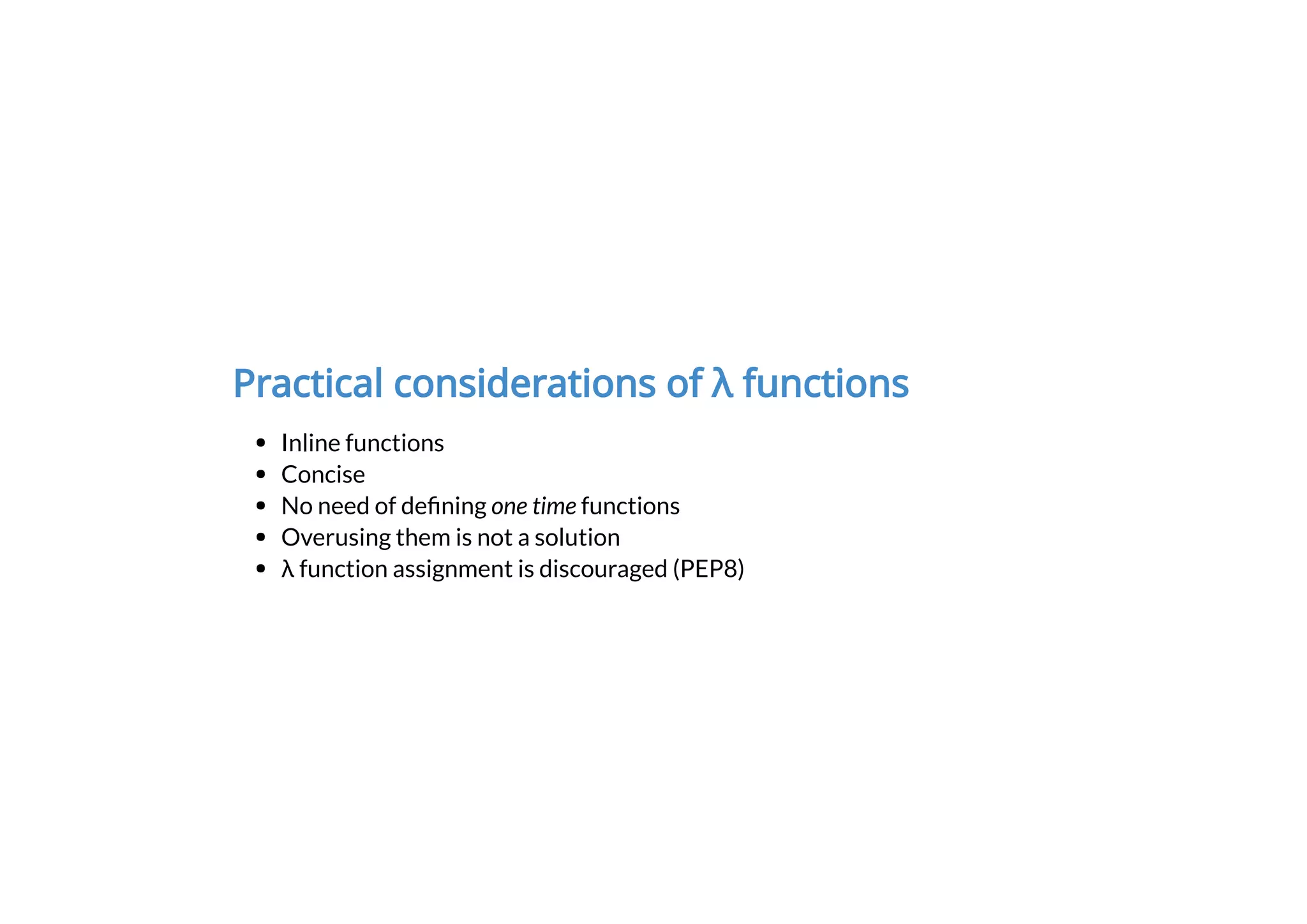

![In [8]: value = 100
def change_f_value(new_f_value=5):
value = new_f_value
print("Value in function %s" %value)
print("Initialized value %s "%value)
change_f_value()
print("Final value %s "%value)
Initialized value 100
Value in function 5
Final value 100](https://image.slidesharecdn.com/fp-160417065358/75/Rethink-programming-a-functional-approach-23-2048.jpg)

![In [9]: class Foo:
def __init__(self, value):
self.value = value
foo_obj = Foo(value=10)
def func(obj):
obj.value = 3
print("Object ID: %i" %id(foo_obj))
print("Object 'value' field before applying function: %i" %foo_obj.value)
func(foo_obj)
print("Object 'value' field after applying function: %i" %foo_obj.value)
print("Object ID: %i" %id(foo_obj))
Object ID: 4443530520
Object 'value' field before applying function: 10
Object 'value' field after applying function: 3
Object ID: 4443530520](https://image.slidesharecdn.com/fp-160417065358/75/Rethink-programming-a-functional-approach-25-2048.jpg)


![In [10]: import random
import pprint
from collections import namedtuple
data = str(random.random() + 4)
MyObj = namedtuple("MyClassReplacement",("some_string", "my_smart_function",))
o = MyObj(
some_string=data,
my_smart_function=lambda item: float(item)*3)
some_string, some_function = o
o2 = o._replace(some_string="a new dummy string")
assert(o.my_smart_function(o.some_string) == float(o.some_string) * 3)
assert (some_string == data)
assert not id(o) == id(o2)](https://image.slidesharecdn.com/fp-160417065358/75/Rethink-programming-a-functional-approach-28-2048.jpg)
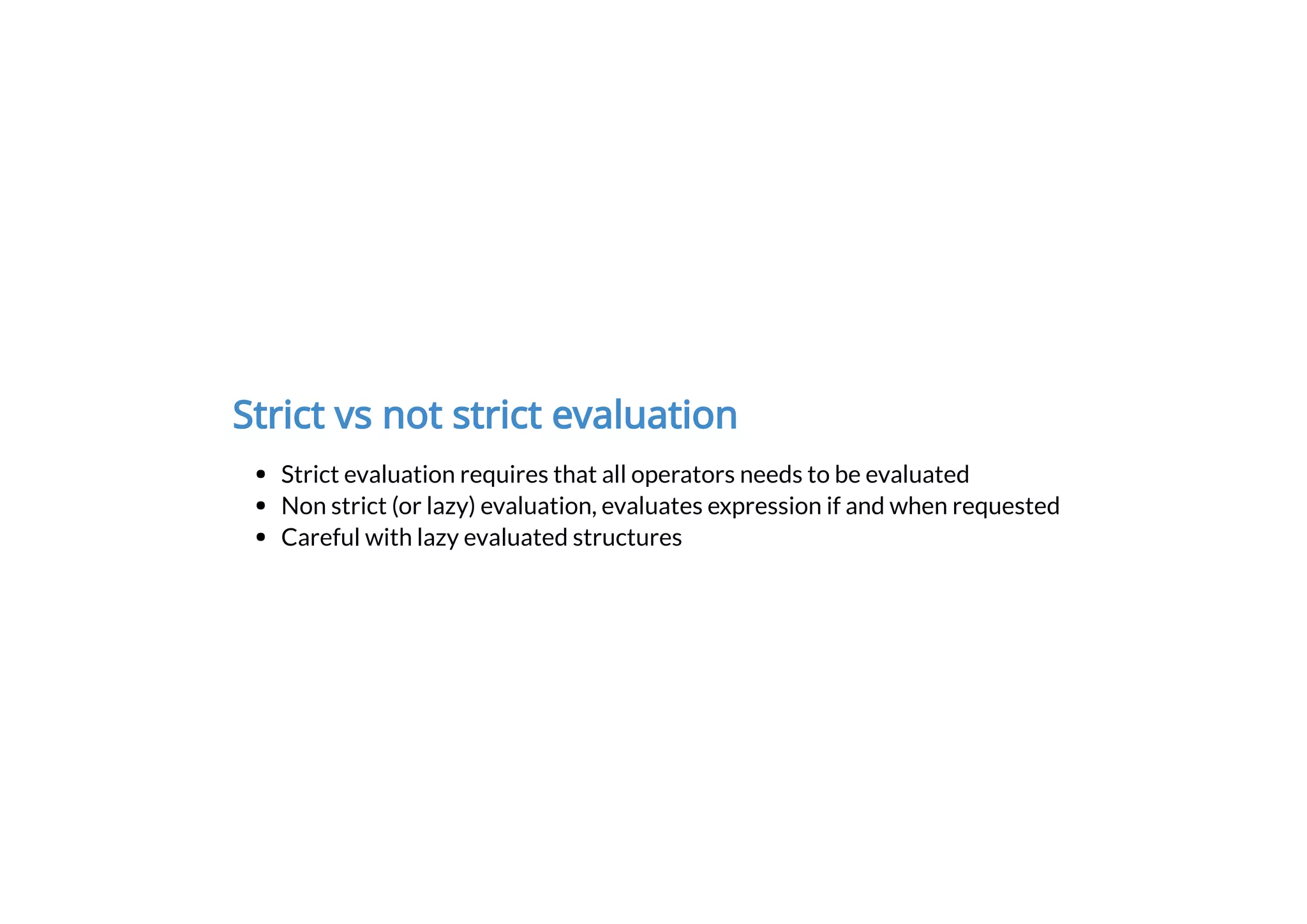
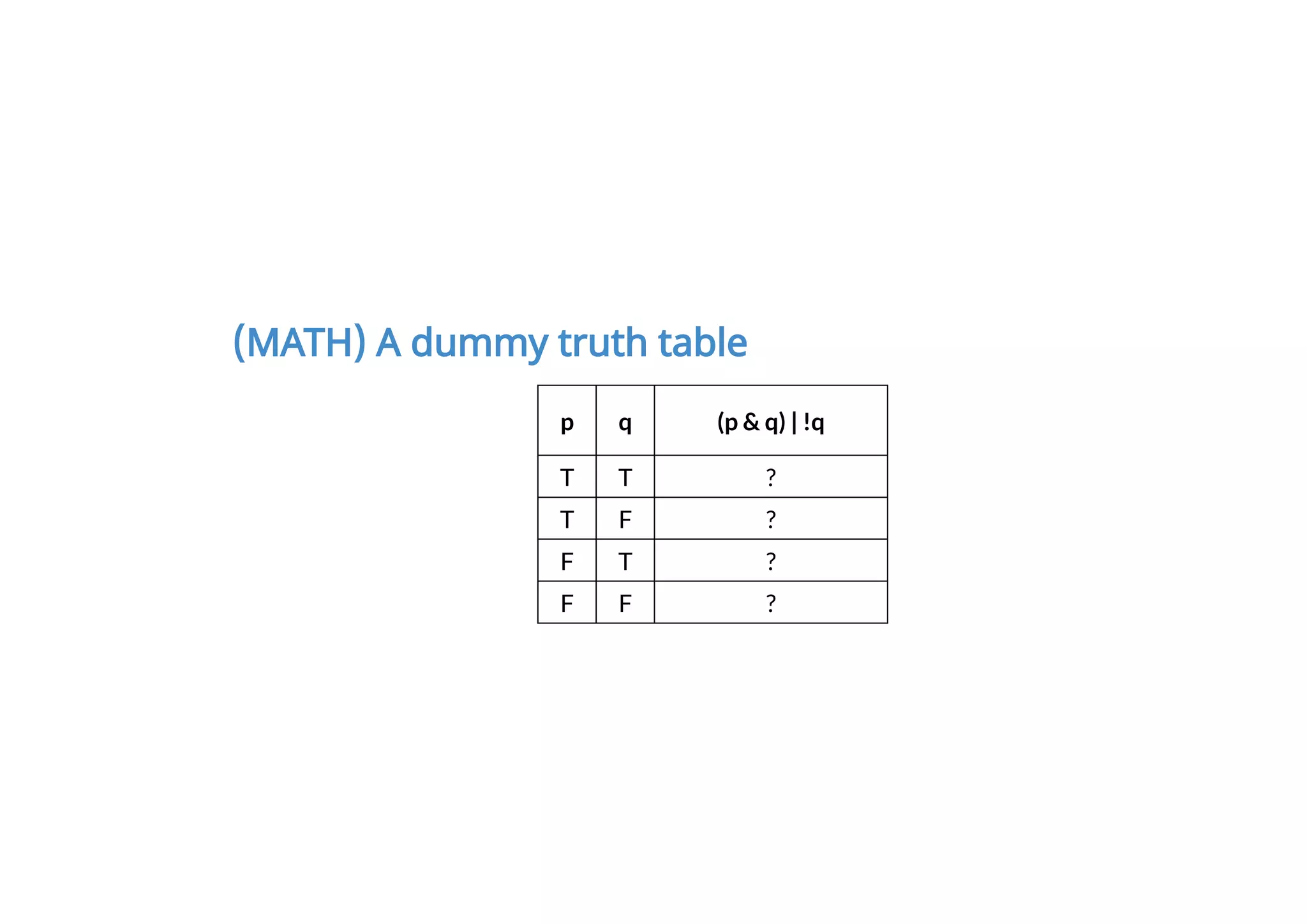
![In [11]: import random
generate_random_list = lambda size: [random.choice([True, False]) for _ in
range(0, size)]
def all_true_values(lst):
print("evaluating ALL true values")
return all(lst)
def any_true_value(lst):
print("evaluating ANY true values")
return any(lst)
all_true_values(generate_random_list(size=10)) and any_true_value(generate_random_
list(size=10))
print("+++++++++++")
all_true_values(generate_random_list(size=10)) or any_true_value(generate_random_l
ist(size=10))
Out[11]:
evaluating ALL true values
+++++++++++
evaluating ALL true values
evaluating ANY true values
True](https://image.slidesharecdn.com/fp-160417065358/75/Rethink-programming-a-functional-approach-31-2048.jpg)
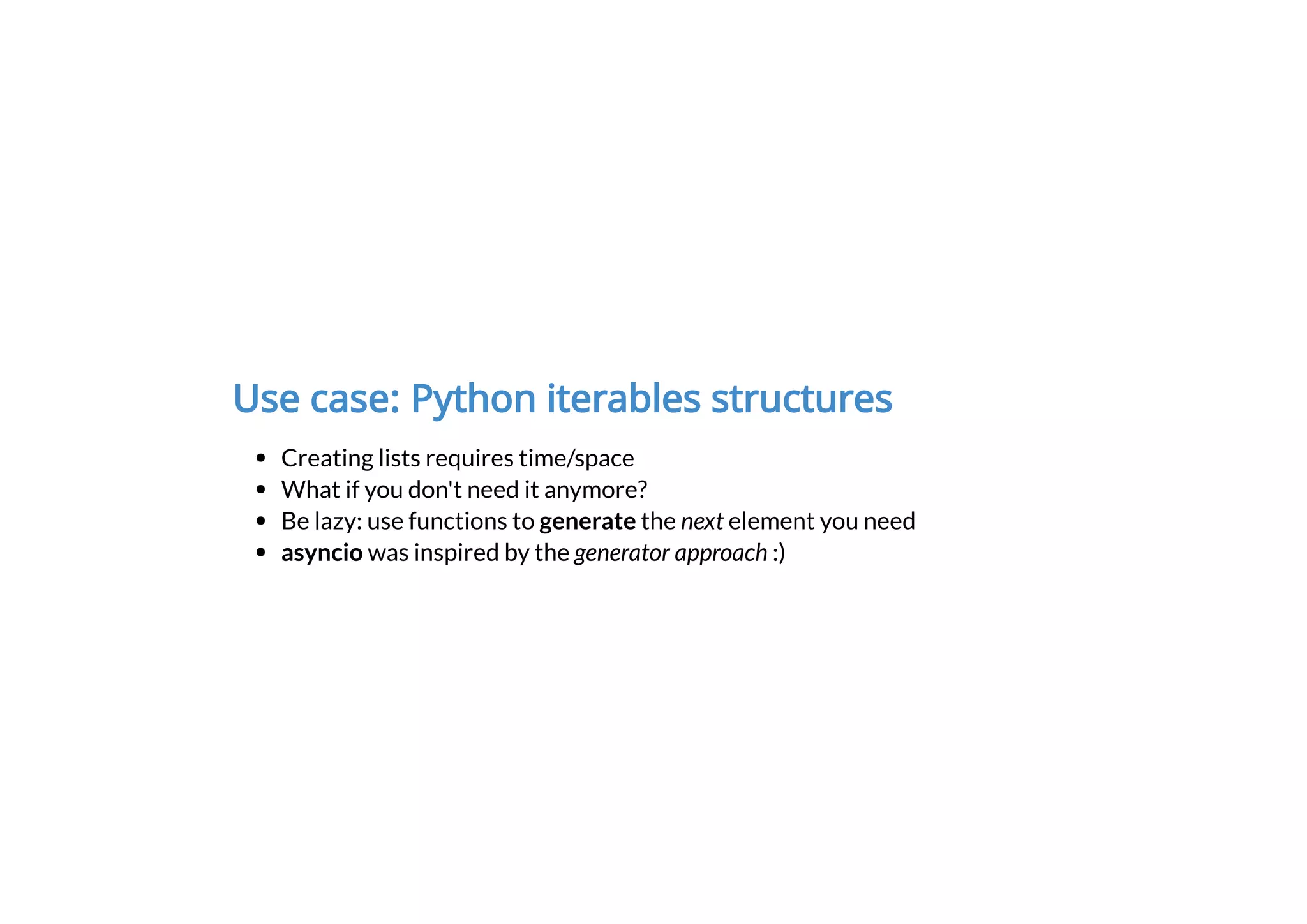
![In [12]: import random
def lc():
return [random.random() for _ in range(0, 10)]
def _iter():
return iter([random.random() for _ in range(0, 10)])
def lazy_1():
for item in range(10, size):
if not item % 2 and not str(item).endswith("4"):
yield item
def lazy_2():
yield from (r for r in range(0, 10) if not r % 2 and not str(r).endswith("4"))
print(lc())
print(_iter())
print(lazy_1())
print(lazy_2())
[0.3715365641589854, 0.21968153174666838, 0.5694550450864405, 0.67849617189266
75, 0.12265891948697638, 0.9803208951269902, 0.9661576370333822, 0.69911857951
80963, 0.9940147002373155, 0.4647425397290714]
<list_iterator object at 0x108e2fdd8>
<generator object lazy_1 at 0x108dd36c0>
<generator object lazy_2 at 0x108dd36c0>](https://image.slidesharecdn.com/fp-160417065358/75/Rethink-programming-a-functional-approach-33-2048.jpg)
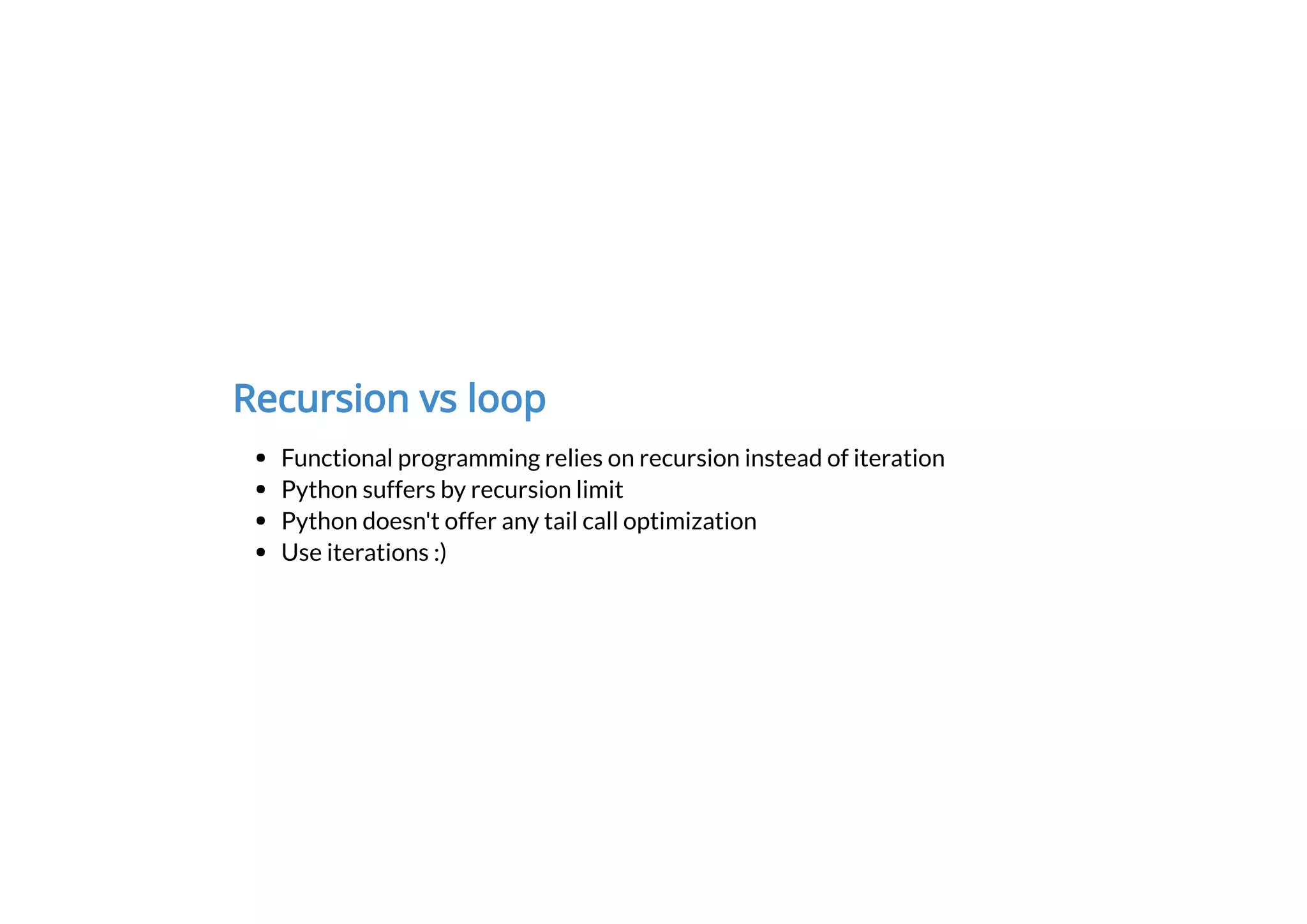
![In [13]: def facti(n):
if n == 0: return 1
f= 1
for i in range(2,n):
f *= i
return f
def fact_nt(n):
if n == 0: return 1
else: return n*fact(n-1)
def fact(n, acc=1):
if n == 0:
return acc
return fact(n-1, acc*n)](https://image.slidesharecdn.com/fp-160417065358/75/Rethink-programming-a-functional-approach-35-2048.jpg)

![In [14]:
In [15]:
def mult(a):
def wrapper_1(b):
def wrapper_2(c):
return a*b*c
return wrapper_2
return wrapper_1
def mult2(a, b, c):
return a*b*c
assert(mult(2)(3)(4) == mult2(2,3,4))
mult1 = mult(2)
mult12 = mult1(3)
mult12(4)
Out[15]: 24](https://image.slidesharecdn.com/fp-160417065358/75/Rethink-programming-a-functional-approach-37-2048.jpg)
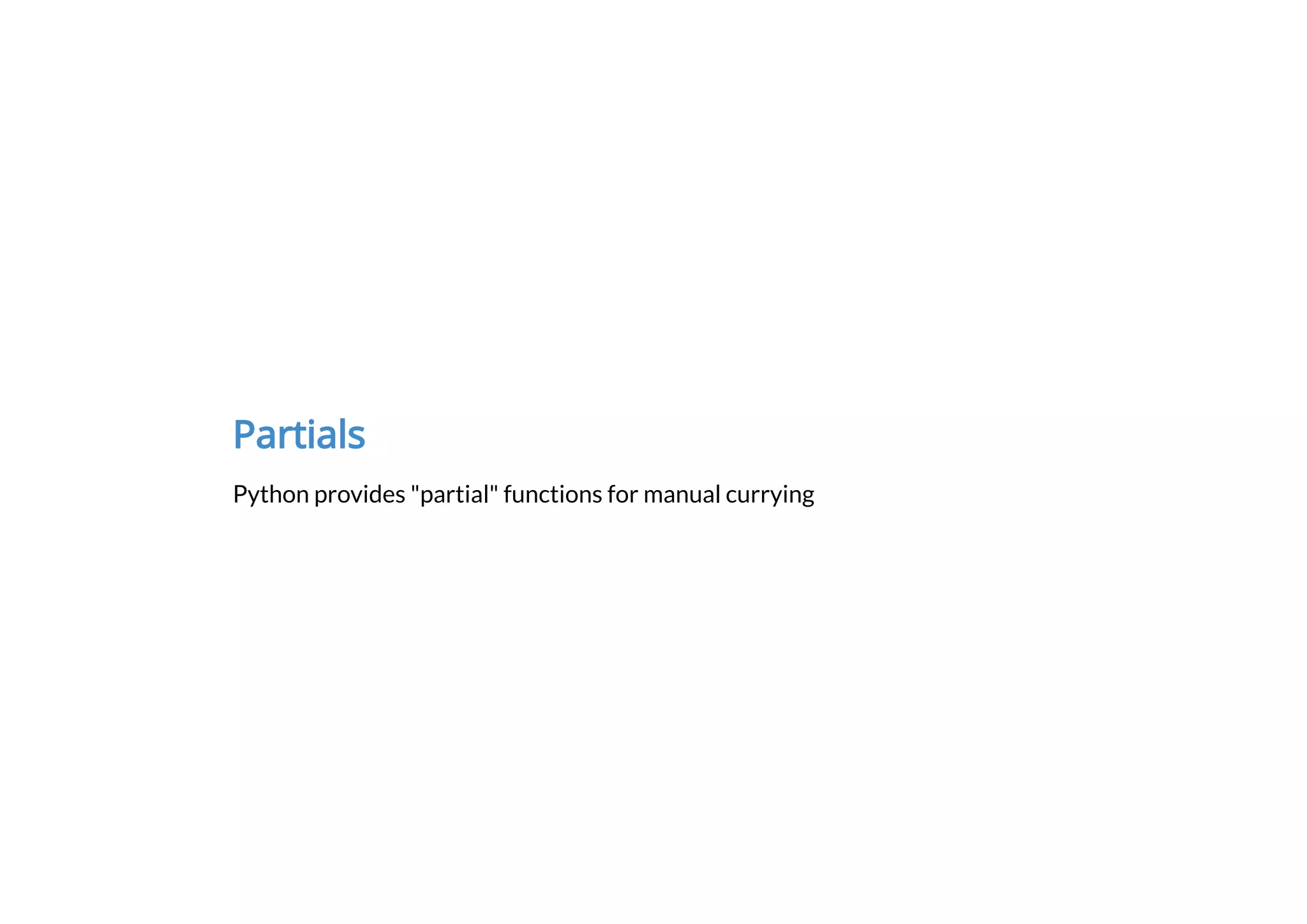
![In [16]: from functools import reduce, partial
import operator
def sum_random_numbers(size):
return reduce(operator.add, (random.random())*size)
def mul_random_numbers(size):
return reduce(operator.mul, (random.random())*size)
def handle_random_numbers(size, function):
return reduce(function, (random.random())*size)
two_random_sum = partial(sum_random_numbers, size=2)
three_random_sum = partial(sum_random_numbers, size=3)
two_random_pow = partial(mul_random_numbers, size=2)
five_random_product = partial(mul_random_numbers, size=5)
three_random_sum = partial(handle_random_numbers, function=operator.add, size=3)
three_random_mod = partial(handle_random_numbers, function=operator.mod, size=3)](https://image.slidesharecdn.com/fp-160417065358/75/Rethink-programming-a-functional-approach-39-2048.jpg)

![In [17]: from functools import wraps
from functools import partial
def get_ned_data(n):
def get_doubled_data(func, *args, **kwargs):
@wraps(func)
def _inner(*args, **kwargs):
kwargs["multiplied_by_n_param"] = kwargs["initial_param"]*n
return func(*args, **kwargs)
return _inner
return get_doubled_data](https://image.slidesharecdn.com/fp-160417065358/75/Rethink-programming-a-functional-approach-41-2048.jpg)
![In [18]: @get_ned_data(n=2)
def double_func(*args, **kwargs):
assert(kwargs["multiplied_by_n_param"] == kwargs["initial_param"]*2)
@get_ned_data(n=3)
def triple_func(*args, **kwargs):
assert(kwargs["multiplied_by_n_param"] == kwargs["initial_param"]*3)
double_func(initial_param=3)
triple_func(initial_param=5)](https://image.slidesharecdn.com/fp-160417065358/75/Rethink-programming-a-functional-approach-42-2048.jpg)
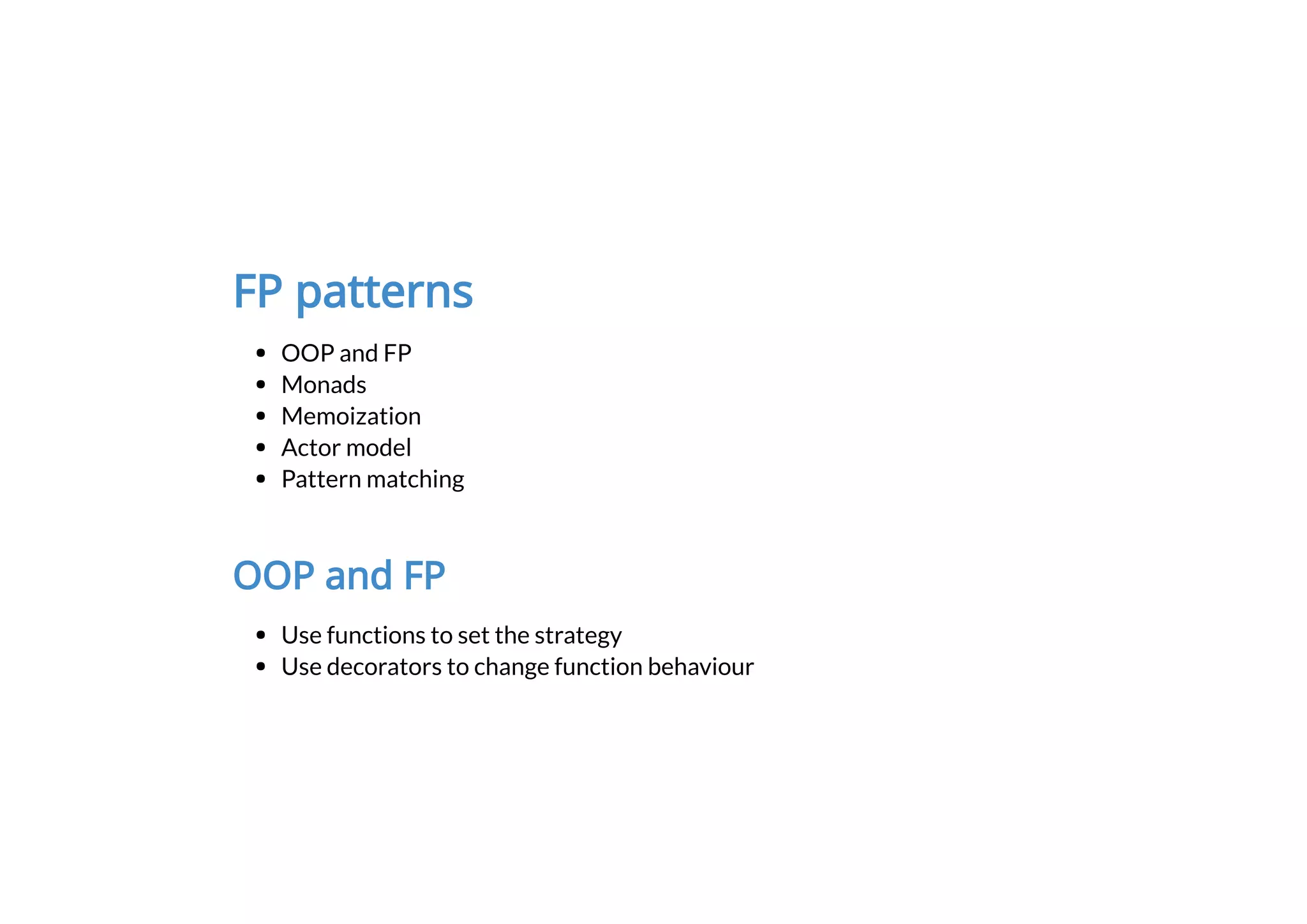
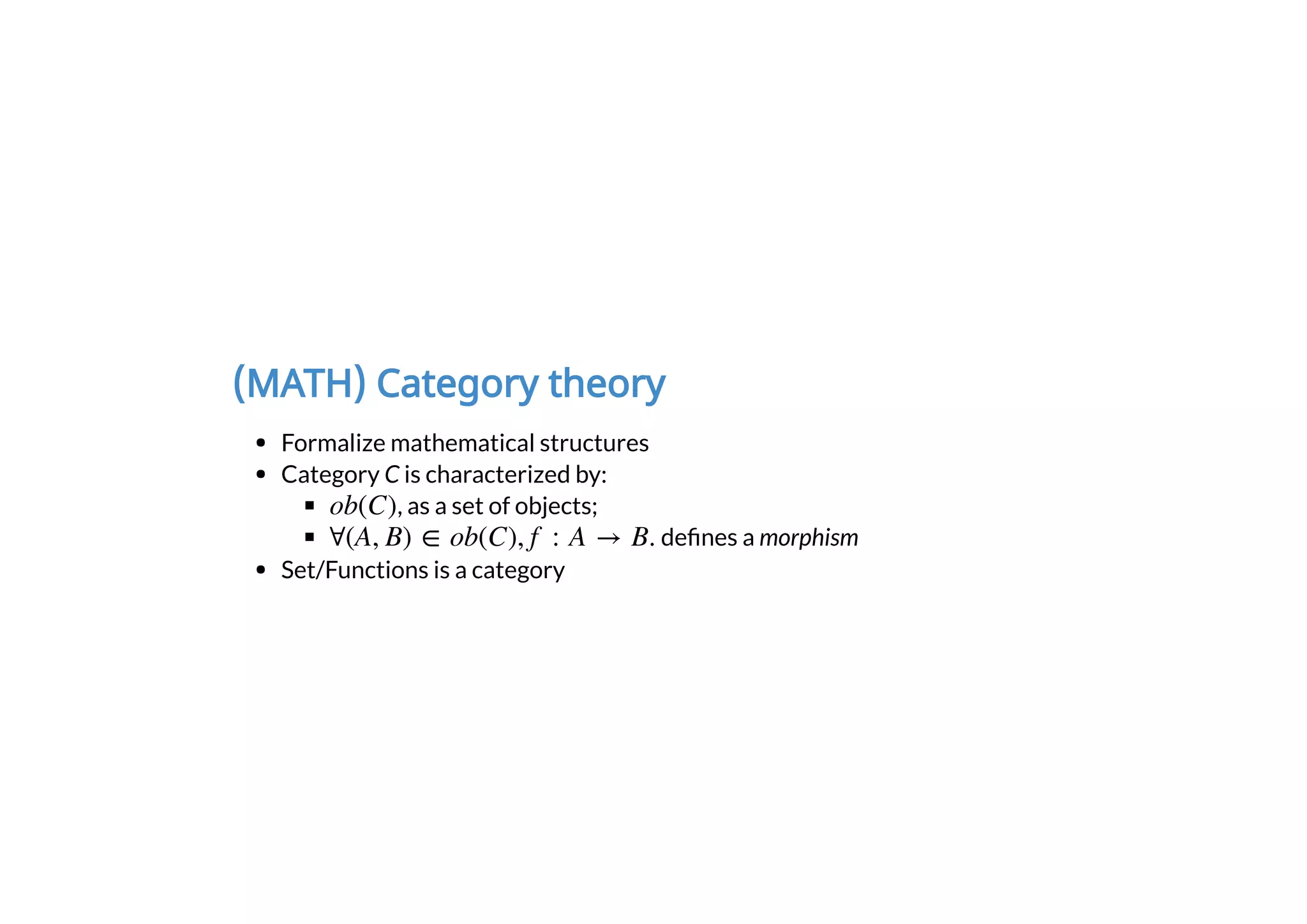
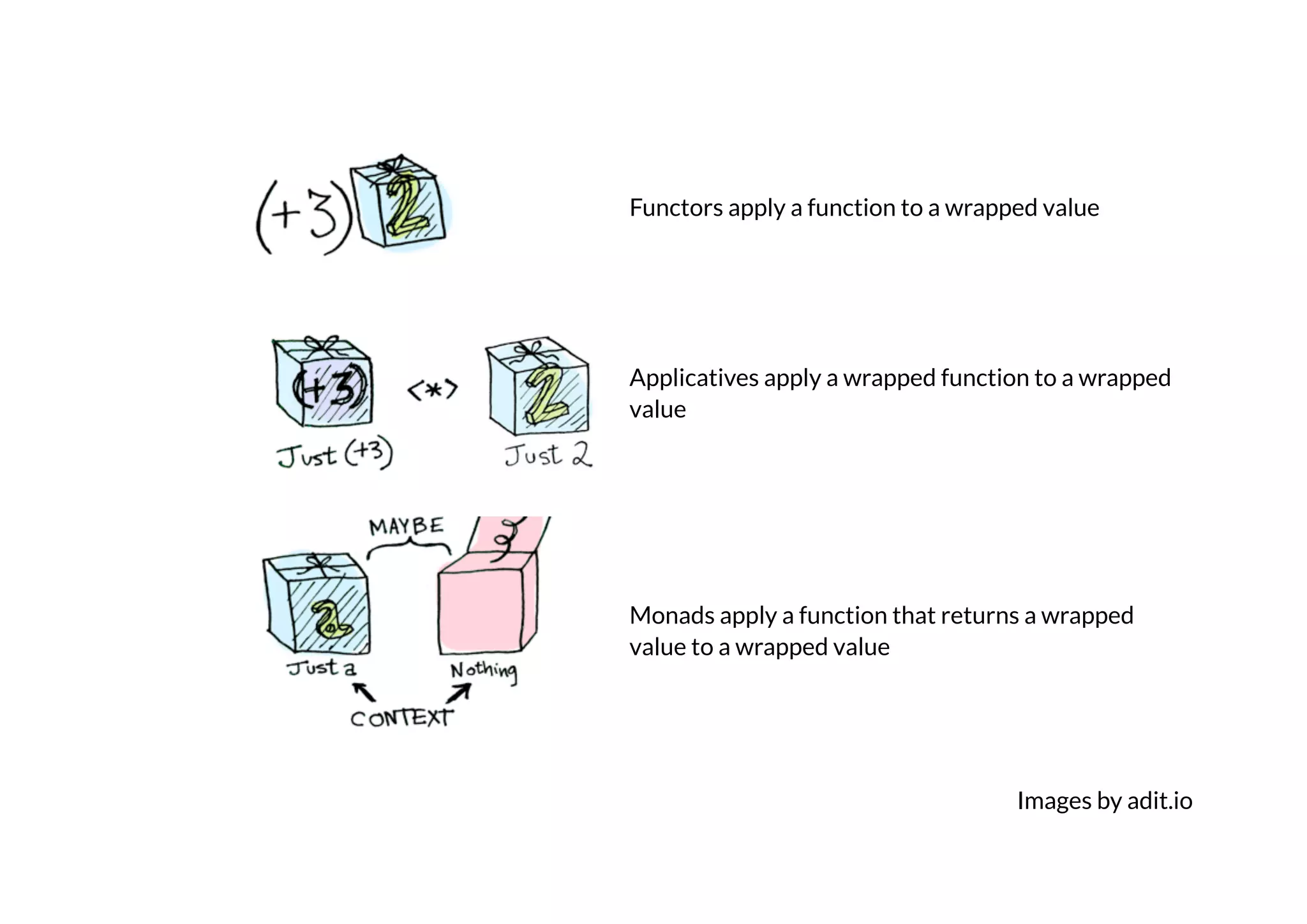
![In [19]: class Container:
def __init__(self, value=None):
self.value = value
def map(self, function):
try:
return Full(function(self.value))
except Exception as e:
return Empty()
class Empty(Container):
def map(self, value):
return Empty()
def __str__(self):
return "Container's empty"
class Full(Container):
def __str__(self):
return self.value
def get_or(self, none_value=None):
return self.value or none_value](https://image.slidesharecdn.com/fp-160417065358/75/Rethink-programming-a-functional-approach-46-2048.jpg)
![In [20]: from fn.monad import optionable
from collections import namedtuple
def get(request, *args, **kwargs):
@optionable
def _get_values(data):
return data.get("values", None)
_split = lambda item: item.split(",")
_strip = lambda item: item.replace(" ", "")
_filter = lambda item: list(filter(lambda i: i, item))
return _get_values(request.body)
.map(_strip)
.map(_split)
.map(_filter)
.get_or(["v1,v2"])
req_class = namedtuple("Request", ("body",))
request_1 = req_class(dict(values="v1, v2,v3"))
request_2 = req_class(dict(values="v1,v2,v3 "))
request_3 = req_class(dict(values="v1, v2,v3, "))
assert(get(request_1) == ['v1', 'v2', 'v3'])
assert(get(request_2) == ['v1', 'v2', 'v3'])
assert(get(request_3) == ['v1', 'v2', 'v3'])](https://image.slidesharecdn.com/fp-160417065358/75/Rethink-programming-a-functional-approach-47-2048.jpg)
![In [21]: from pymonad import List
_strip = lambda item: List(item.replace(" ", ""))
_slice = lambda item: List(item[:-1] if item[-1] =="," else item)
_split = lambda item: List(*item.split(","))
List("v1, v2,v3, ") >> _strip >> _slice >> _split
Out[21]: ['v1', 'v2', 'v3']](https://image.slidesharecdn.com/fp-160417065358/75/Rethink-programming-a-functional-approach-48-2048.jpg)

![In [22]: import functools
def memoize(obj):
cache = obj.cache = {}
@functools.wraps(obj)
def memoizer(*args, **kwargs):
if args not in cache:
cache[args] = obj(*args, **kwargs)
return cache[args]
return memoizer
@memoize
def fact_m(n, acc=1):
if n == 0:
return acc
return fact(n-1, acc*n)](https://image.slidesharecdn.com/fp-160417065358/75/Rethink-programming-a-functional-approach-50-2048.jpg)
![In [28]: from bokeh.plotting import figure, output_file, show, output_notebook
from cmp import get_data, DEF_VALUES
y = get_data()
p = figure(title="Computing factorial", x_axis_label='number', y_axis_label='spent
time' ,tools="pan,box_zoom,reset, save",plot_width=1000, plot_height=300)
p.line(DEF_VALUES, y[0][1], legend=y[0][0], line_width=1,line_color="blue")
p.circle(DEF_VALUES, y[0][1],fill_color="blue", size=8)
p.line(DEF_VALUES, y[1][1], legend=y[1][0], line_width=1,line_color="red")
p.circle(DEF_VALUES, y[1][1],fill_color="red", size=8)
p.line(DEF_VALUES, y[2][1], legend=y[2][0], line_width=1,line_color="green")
p.circle(DEF_VALUES, y[2][1],fill_color="green", size=8)
p.line(DEF_VALUES, y[3][1], legend=y[3][0], line_width=1,line_color="black")
p.circle(DEF_VALUES, y[3][1],fill_color="black", size=8)
output_notebook(hide_banner=True)
show(p)
(http://bokeh.pydata.org/)](https://image.slidesharecdn.com/fp-160417065358/75/Rethink-programming-a-functional-approach-51-2048.jpg)


![In [29]:
Pattern matching
Match data over patterns and apply a function
Scala's pattern matching involve types/expressions/object deconstruction
Implemented via multimethods, a kind of method overloading
%run ./actors.py
21:54:55 [p=12010, t=140736514905024, INFO, pulsar.arbiter] mailbox serving on
127.0.0.1:58006
21:54:55 [p=12010, t=140736514905024, INFO, pulsar.arbiter] started
21:54:56 [p=12047, t=140736514905024, INFO, pulsar.actor1] started
21:54:56 [p=12048, t=140736514905024, INFO, pulsar.actor2] started
Got the message
<Task finished coro=<request() done, defined at /Users/boss/git/talk3/lib/pyth
on3.4/site-packages/pulsar/async/mailbox.py:279> result=None>
Message sent
21:54:57 [p=12010, t=140736514905024, INFO, pulsar.arbiter] Stopping actor1(ia
7a6e0c).
21:54:57 [p=12010, t=140736514905024, INFO, pulsar.arbiter] Stopping actor2(if
eb7f3c).
21:54:57 [p=12047, t=140736514905024, INFO, pulsar.actor1] Bye from "actor1(ia
7a6e0c)"
21:54:57 [p=12048, t=140736514905024, INFO, pulsar.actor2] Bye from "actor2(if
eb7f3c)"
21:54:58 [p=12010, t=140736514905024, WARNING, pulsar.arbiter] Removed actor1
(ia7a6e0c)
21:54:58 [p=12010, t=140736514905024, WARNING, pulsar.arbiter] Removed actor2
(ifeb7f3c)
Bye (exit code = 0)](https://image.slidesharecdn.com/fp-160417065358/75/Rethink-programming-a-functional-approach-54-2048.jpg)

